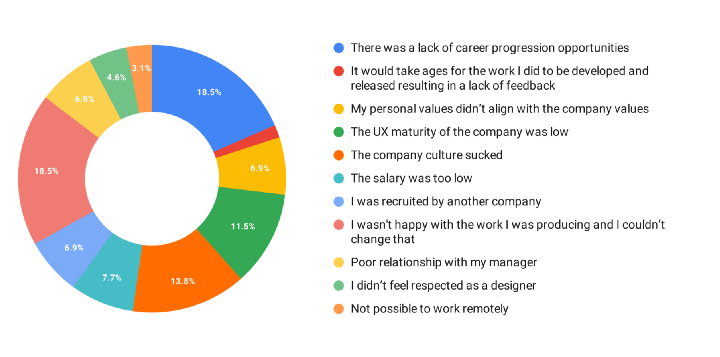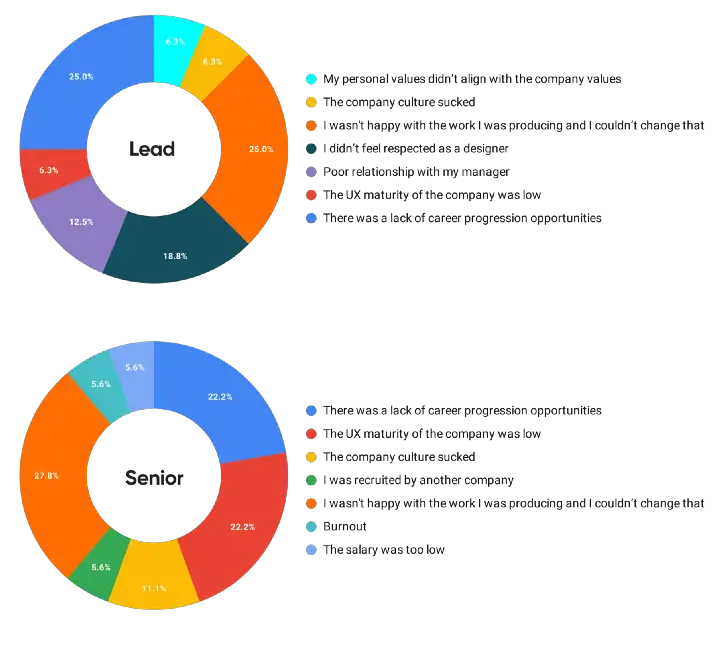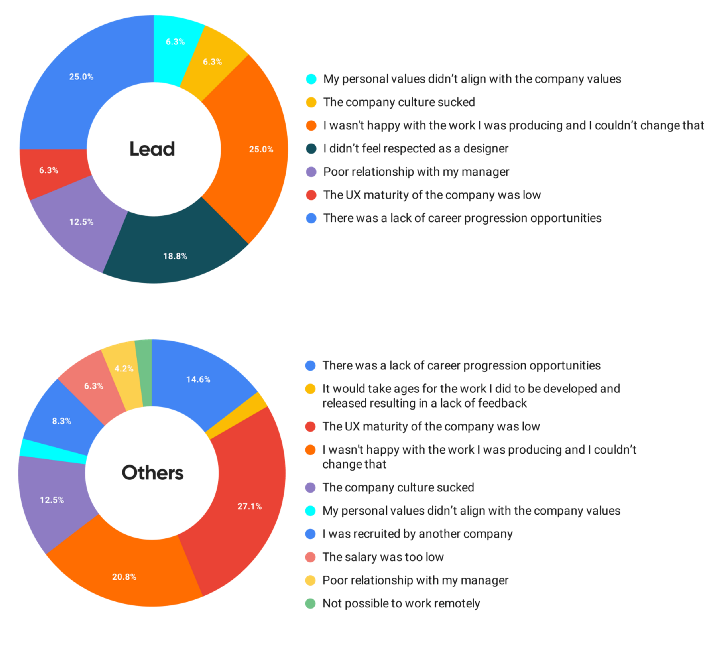There are two equal parts, both at around 19 percent: no career progression opportunities, and unhappiness with the work they do. Problems with company culture comes afterwards with almost 14 percent, and problems with a lack of UX maturity right after that with 11 percent. Almost 8 percent of designers left because their salary was too low, around 7 percent because of a poor relationship with their manager and another 7 percent because of misalignment with company values. Two surprises from the overall distribution: designers don’t have problems with a lack of speed anymore and they want the possibility to work remotely.

Three reasons for quitting stand out:
- There was a lack of career progression opportunities
- The UX maturity of the company was low
- I wasn’t happy with the work I was producing and I couldn’t change that
But combing the data, slicing it by seniority and designer type, and analysing it shows the most interesting findings.
No career progression opportunities
Let’s take a closer look at one of the two most common reasons for designers quitting their jobs — no possibility for career progression. 18.5 percent chose this answer and I’m not surprised. It aligns well with the seniority distribution. As we saw, there are a lot of designers in lead positions, and an equal amount of them in senior roles (both at around 27 percent). There’s a ceiling for these designers because the higher you get on the ladder, the smaller the scales get. The higher designers get on the seniority ladder, the harder it is for them to get to the next step. There can be only one Head of Design at a company, for example.

22 percent of senior designers picked this answer as their main reason, as well as 19 percent of designers in lead positions (Staff, Principal, Lead). For comparison, none of the junior designers, and only 10 percent of intermediate designers had this problem.
Problems with UX maturity
Problems with UX maturity continue to be an issue for designers. At least for those in junior, senior, and intermediate seniority level. 19, 20, and 25 percent respectively chose the answer “The UX maturity of the company was too low” as the main reason for quitting. I don’t find it surprising that out of these three, the junior roles are the least likely to quit because of it. When I was a junior designer I was happy to do any type of design work. But the more experienced I got, the more sophisticated design work I wanted to do. No surprises here.

Here’s something interesting: only 5 percent of designers in lead roles (staff, principal, lead, manager) chose this answer. Is it because they have a positive impact on the UX maturity? Or does the presence of these higher seniority roles itself indicate that a company is more UX mature? There has to be a correlation here, I just don’t know what it is yet.
Unhappiness with the work they do
So the more senior the designers, the higher the UX maturity. But there’s another relation with high seniority of designers. The more senior they are, the less they are happy with the work they do. 24 percent of senior designers, 19 percent of lead designers, and 14 percent of intermediate ones chose the answer “I wasn’t happy with the work I was producing and I couldn’t change that” as their main answer for quitting their job. For comparison, only 10 percent of junior designers chose this answer. I don’t know yet how to interpret this information, but maybe it’s somehow connected to the previous problem from above? Is it because they’re stuck in their career, want to do more, want to have more responsibility but they can’t?
Design generalists are happier with the work they do
Design generalists stand out here. They’re mostly senior and lead designers when it comes to seniority (none of them in the study was junior). But unlike other designers of comparable seniority, they enjoy the work they do. Only 11 percent of them chose the “I wasn’t happy with the work I was producing and I couldn’t change that” answer, compared to 24 and 19 percent for senior and lead designers from above who aren’t generalists. Is it because they get to do a wider range of tasks, use more skills, and continue to learn more?

Another interesting thing about designer generalists is that they get recruited more often. 22 percent of them chose the answer “I was recruited by another company” as their main reason for quitting, compared to 7 percent for intermediate, 5 for senior, and 10 for junior designers. It’s something that definitely sticks out and maybe another thing indicative of the trend I mentioned in the beginning of this post. Are design generalists getting more desirable? I think that may be the case but let’s wait and see what the next years will bring.
